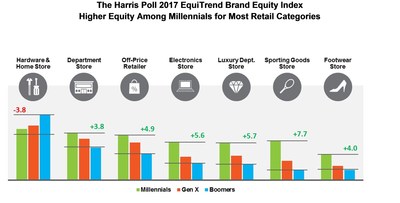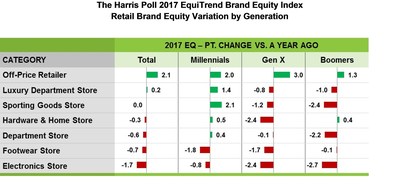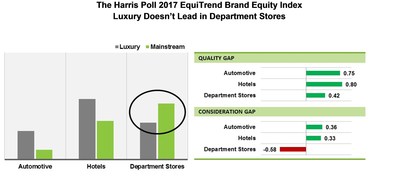
Death Spiral? Millennials Breathe Life Into Retail
Harris Poll Study Shows Millennials Award Higher Brand Equity to Retail Stores Compared to Older Generations
Off-Price is the Only Retail Category to Grow Brand Equity Over Past Year; Other Categories Show Generational Movement
Luxury Label Doesn't Hold Same Prestige with Department Stores as in Auto, Hotels
Nordstrom, Dick's Sporting Goods, DSW, Kohl's, Best Buy, TJ Maxx and The Home Depot Take Brand of the Year Honors
NEW YORK, May 10, 2017 /PRNewswire/ -- Millennials are breathing life into retail brands, according to new research from The Harris Poll®. Compared to older generations, millennials award higher brand equity to all retail categories assessed, except hardware and home stores, which is favored by baby boomers. The Harris Poll's 29th annual EquiTrend Study, which measures brand health over time, reveals the strongest brands across the media, travel, financial, automotive, entertainment, retail, restaurant, technology, household and nonprofit industries, based on consumer response.
According to Harris Poll's research, while brand equity in the retail category has held steady over time, a different pattern emerges when millennials are singled out versus baby boomers. Sporting goods store brand equity is 7.7 points higher among millennials compared to baby boomers, while luxury department stores (+5.6) and electronics stores (+5.7) are nearly 6 points higher. Millennials' brand equity score for off-price retailers is 4.9 points higher compared to baby boomers, while footwear and department stores are 4 points and 3.8 points higher, respectively. Only hardware and home stores (-3.8) have lower brand equity among millennials compared to baby boomers.
The Harris Poll 2017 EquiTrend Brand Equity Index
Higher Equity Among Millennials for Most Retail Categories
"Strong brand equity – including greater familiarity with your brand, a greater bond with your brand, a better-perceived quality of your brand – translates into a larger share of wallet," said Joan Sinopoli, vice president of brand solutions at The Harris Poll. "It's no secret that the retail industry is undergoing tremendous challenges, but knowing how to best cater to different customer segments is critical. As a result, several retailers are working to revamp their stores into 'millennial playgrounds' to help woo and wow desired customers."
The EquiTrend Brand Equity Index is comprised of three factors—Familiarity, Quality and Purchase Consideration—that result in a brand equity rating for each brand. Brands ranking highest in equity receive the Harris Poll EquiTrend "Brand of the Year" award for their respective categories. This year, more than 100,000 U.S. consumers assessed more than 4,000 brands across more than 450 categories. The full Harris Poll EquiTrend Brands of the Year list can be found at http://www.theharrispoll.com/equitrend-rankings/2017.
Off-Price Shows Equity Growth, Other Retail Categories Show Generational Movement
According to Harris Poll's research, off-price is the only retail category to increase its brand equity compared to last year, up 2.1 points. While luxury department stores and sporting goods stores are flat among consumers overall, we see equity growth among millennials. Generation X shows a 3-point equity increase for off-price retail and negative growth for all other retail categories. Baby boomers award positive equity to off-price retail (+1.3) and hardware and home stores (+0.4).
The Harris Poll 2017 EquiTrend Brand Equity Index
Retail Brand Equity Variation by Generation
Luxury Doesn't Offer Retail the Same Advantage it Provides to Auto, Hotel
Harris Poll's analysis shows that when attached to department stores, the luxury designation doesn't offer brands the same benefit it does in other categories, such as automotive and hotels. Consumers grant stronger equity scores to mainstream department stores brands compared to luxury department stores. Additionally, there is a less pronounced gap in perceived quality between luxury and mainstream department stores and purchase consideration favors the mainstream.
The Harris Poll 2017 EquiTrend Brand Equity Index
Luxury Doesn't Lead in Department Stores
"Department stores have struggled with Gen X and millennials for some time; Gen X led the charge toward brick and mortar specialty stores and millennials followed suit, favoring online specialty shopping," said Sinopoli. "Meanwhile mainstream retailers like Kohl's and Target, experimenting with different formats and designer names, have forced luxury stores to play price wars. To many consumers, luxury stores have simply stopped offering a luxury difference, and that's why we see retailers like Nordstrom actively working to bring millennials into their stores with rotating pop-up shops and personalized customer experiences, and Lord & Taylor taking steps to reposition and differentiate as the shopping destination for dresses."
The 2017 Harris Poll EquiTrend Retail Brands of the Year
| Award Category |
Brand |
| Department Store |
Kohl's |
| Electronics Store |
Best Buy |
| Footwear Store |
DSW (Designer Shoe Warehouse) |
| Hardware & Home Store |
The Home Depot |
| Luxury Department Store |
Nordstrom |
| Off-Price Retailer |
TJ Maxx |
| Sporting Goods Store |
Dick's Sporting Goods |
Full category lists can be viewed at http://www.theharrispoll.com/equitrend-rankings/2017.
Other Key Findings
Additional retail findings include:
- Nordstrom holds on to the Luxury Department Store Brand of the Year title for the second consecutive year, but the Ivanka Trump controversy seems to have had an impact. Nordstrom's decline in brand equity among conservatives contributed to a decline in brand equity overall. Among liberal-leaning consumers, Nordstrom's brand equity rose slightly; among conservative-leaning consumers, Nordstrom's brand equity declined four points1.
- This year marks The Home Depot's fifth consecutive Brand of the Year award, with familiarity as its key equity distinction. Ninety-six percent of consumers are familiar with The Home Depot. Baby boomers give the equity advantage to The Home Depot, with stronger quality and purchase consideration marks compared to younger consumers.
- Kohl's, Department Store Brand of the Year 2012 – 2015, reclaims its title from Macy's. Although the retailer has lower familiarity ratings than JCPenney and Sears, it shows higher marks overall for quality and purchase consideration. Gen X consumers push Kohl's to its higher equity score, with higher familiarity and purchase consideration ratings.
- TJ Maxx, Off-Price Retailer Brand of the Year, and Best Buy, Electronics Store Brand of the Year, maintain their titles for the second consecutive year, and TJ Maxx receives its highest equity score ever (67). With consumers consistently seeking deals, outlets are a popular option, but Harris Poll data shows TJ Maxx besting some of the more luxury outlet options.
- Dick's Sporting Goods reclaims its Sporting Goods Store Brand of the Year honor from Cabela's; Dick's was also Brand of the Year in 2015. Dick's equity is driven by millennials and Gen X consumers.
- DSW is Footwear Store Brand of the Year for the fourth consecutive year, helped by stable quality and purchase consideration ratings.
Methodology
The 2017 Harris Poll EquiTrend Study is based on a sample of 102,617 U.S. consumers ages 15 and over surveyed online, in English, between December 30, 2016 and February 21, 2017. The survey took an average of 30 minutes to complete. The total number of brands rated was 4,052. Each respondent was asked to rate a total of 40 randomly selected brands. Each brand received approximately 1,000 ratings. Data was weighted to be representative of the entire U.S. population of consumers ages 15 and over based on age by sex, education, race/ethnicity, region, income, and data from respondents ages 18 and over were also weighted for their propensity to be online. Respondents for this survey were selected from among those who have agreed to participate in Harris Poll surveys. Because the sample is based on those who agreed to participate in our panel, no estimates of theoretical sampling error can be calculated.
The Brand Equity Index is the keystone to the EquiTrend program, providing an understanding of a brand's overall strength. A brand's Equity is determined by a calculation of Familiarity, Quality and Purchase Consideration. Brand of the Year is determined by a simple ranking of brands.
The Harris Poll EquiTrend methodology has been validated by academic business experts in the Journal of Marketing Research (1994) and International Journal of Research on Marketing (2012).
These statements conform to the principles of disclosure of the National Council on Public Polls.
About The Harris Poll
Over the last five decades, Harris Polls have become media staples. With comprehensive experience and precise technique in public opinion polling, along with a proven track record of uncovering consumers' motivations and behaviors, The Harris Poll has gained strong brand recognition around the world. The Harris Poll offers a diverse portfolio of proprietary client solutions to transform relevant insights into actionable foresight for a wide range of industries including health care, technology, public affairs, energy, telecommunications, financial services, insurance, media, retail, restaurant, and consumer packaged goods.
Harris Poll EquiTrend study results disclosed in this release may not be used for advertising, marketing or promotional purposes without the prior written consent of Harris Poll. All third party trademarks are the property of their respective owners. Use of such trademarks does not constitute or imply any sponsorship or endorsement.
1 Consumers surveyed between December 30 and February 21; Trump's Nordstrom tweet on February 8.
CONTACT:
Jennifer Frighetto, [email protected], 847.702.5304
SOURCE The Harris Poll








Share this article